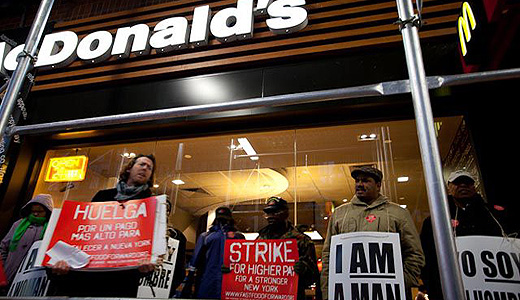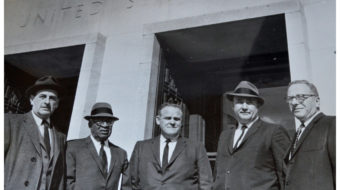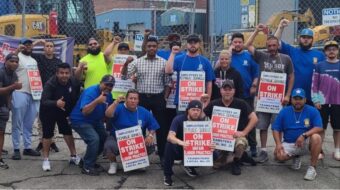
The McDonald’s plan for how its workers can make it on their paltry salaries is all over the Internet now, just a day after the fast food giant posted it on a new website.
McDonald’s has gotten together with Visa to launch an entire website that aims to “help” its workers who make, on average, $8.25 per hour – not by raising their salaries, but by telling them how to budget their income.
The intended message of the site – PracticalMoneySkills.com – is that McDonald’s workers should be able to live on their low wages. But it inadvertently illustrates exactly why it is almost impossible to get by on what the company pays.
The website sports a “sample monthly budget” for workers that totally distorts what one has to do to budget on a minimum wage job.
The “budget” assumes that the McDonald’s employee will have a second job paying about $1,000 a month to supplement the McDonald’s job which itself pays only $1,000 a month. (This, of course, amounts to an admission that it is impossible to live on a McDonald’s salary alone.)
But the problem with the “budget” doesn’t stop there. The estimates it gives for employees’ costs must be drawn from either another planet or some era that has long since gone by. It allows $20 a month for health care, nothing at all for heat, and $600 a month for rent. Not a penny is budgeted for food or clothing.
Assuming one can live without food, a McDonald’s worker might have a chance of making that type of budget work if he or she lived north of the Arctic Circle in July and close to the Equator in January. (Minimize the need for both clothing and heat.)
But then that wouldn’t work either. Although the budget includes $150 a month for car payments it lists nothing for fuel or any other transportation costs.
Since McDonald’s is an “equal opportunity” employer, the entire budget is available in Spanish too. Written on the website, in your choice of English or Spanish, then, is the encouraging line: “You can have almost anything you want as long as you plan ahead and save for it.” (The Mickey D budget says its workers should be able to save $100 a month.)
Nothing at all in the budget ends up approximating the realities workers face.
For an uninsured individual to buy health care coverage, he or she must pay at least $200 a month for an individual plan. Even that will only buy coverage that has major gaps. You might, let’s say, get into a hospital but then have to figure out how to pay for anything they do to you while you are there.
Only a few full-time McDonald’s workers qualify for the company’s $14 a week health care plan, but that plan stops paying out once the worker incurs costs of $10,000 in any given year. A minor outpatient procedure at a hospital, with the necessary monitoring by a doctor, often costs more than that.
The McDonald’s budget, as we noted, assigns $0 per week for food. A very tight weekly food budget for an individual would be in the range of $35 a week. It would be tough feeding a family of four, then, on anything less than $900 a month.
What about the $600 for rent? Rents are higher than that all around the country. In New York City, rents are now averaging $3,000 per month.
McDonald’s workers, of course, have already made it clear that they won’t be satisfied with their employer handing them suggested budgets. They have been rising up, along with fast food workers all over the country, to demand a living wage.
There have been strikes and walkouts in cities across the nation, including New York, Los Angeles, Chicago, Washington D.C., Seattle, Philadelphia, Miami and elsewhere.
In many cities workers have walked out of not just McDonald’s but also Burger King, Taco Bell, Subway, Domino’s and many other chains. There is no indication, the new budget website notwithstanding, that the movement for serious increases in wages and benefits will slow down any time soon.
Photo: Fast Food Forward Facebook page.










